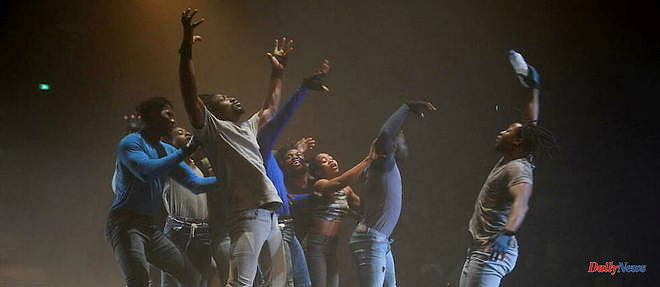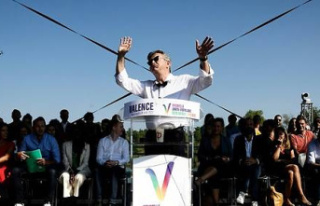Since April, Circus Baobab has been offering the Parisian public an extraordinary show that they won't soon forget. For an hour, Guineans aged 18 to 32 perform a series of numbers based on human pyramids and thrown lifts, punctuated by precise dances, with the backdrop of the problem of water when plastic has invaded the whole world. country. One of the acrobats, Fodé Kaba Sylla dit Vichy, reminds us that this is a perilous staging. “Normally there are fifteen of us, but two of us got injured in training… But we are used to it, we are tough, we come from the street. »
The troop that we discovered in the 2022 final of the show La France a un Incroyable Talent on the television channel M6 has already passed through Morocco, Germany, Belgium and will soon meet in Sweden, Finland or in Brazil. Artists in residence in the two theaters of La Scala, Mélanie and Frédéric Biessy, they will also be programmed at the Avignon festival this summer. A historic success which is the fruit of long fieldwork. The project actually saw the light of day in 1998 thanks to the film director Laurent Chevallier assisted by the Guinean Minister of Culture at the time, Telivel Diallo. Seeking to follow a traveling circus for a film project, they put together Africa's first aerial acrobatic circus, which has since become a model for the entire continent. "Our goal is to shine in a number of African countries, so that we can say that the circus can give the future", explains Vichy.
About ten years ago, the second generation of Circus Baobab was formed. She is now a real family. "We travel together, we eat together, we sleep together, we do everything together," says Otto Fodé Camara, trapeze artist with a beautiful smile. “The director Yann Ecauvre came to see us in Guinea so that we could choose the theme together. We thought about the country's problems, we talked about hardship, unemployment, political worries, etc. We chose water, because Guinea is supposed to be the water tower of West Africa, but like in many countries, there is a terrible shortage at the moment. »
As an association, the circus does not forget its initial ambition, which is to train underprivileged children to become professional artists. “It all started in the poor neighborhoods where we come from. At first we were hiding to rehearse,” Camara explains. “It was not easy because of the situation in the country, our families and the lack of support. The children, the vast majority of whom came from the Matam district, gathered on the beaches of Conakry to train. Candela, who has been in the circus for almost twenty years, explains, "I haven't been to school. The big brothers took us when we were little. I started at 9 years old. I worked every day, from morning to night! And it took me over ten years of training before I was confirmed and able to tour. ". Apolitical, they are however aware that their social integration action with the country's youth sets an example. “Only hard work pays, they say. The result is that I can travel and earn money where there are many who are left in poverty. he adds.
For Guineans, it is also a message sent. Because it's even harder for women, as confirmed by Aïcha Kaïta, one of the two female acrobats in the show. “Our mothers would prefer to keep us at home. The parents first think that because of the circus, we are not going to have children, whereas it is a way of extracting ourselves from social difficulties. The choice of the next show was made in this sense and will concern violence against women with excision as the main subject.
For Richard Djoudi, a former child of the Ddass, who became a producer of Circus Baobab, this particular experience of social integration will be able to spread throughout Europe. “In France, there is a huge demand for Circus Baobab to support cities in social circus and to take care of fragile individuals. ". The lover of the African continent adds that "for once, it's a project that comes from Africa and goes to Europe... We're too used to it happening the other way around, whereas you just have to be a bit curious to see that Africa has a lot to teach us. It's time for this to be a balanced exchange. »
Thanks to Circus Baobab, social circus schools are currently being set up all over France, with former artists in turn becoming trainers. Some are already teaching in Marseille or Châtellerault, with the next base to come being Paris. What counts is the transmission, insists Richard Djoudi. In addition, "Guinea, politically, has a huge card to play internationally with Circus Baobab. It is a model for the country because it is the rebirth of a real school of circus arts. But it is also literacy, learning hygiene and body work as well as all the related trades such as sound, light, management, etc. »
In the meantime, the first returns of Yé! are dithyrambic. "We can see that the audience is touched, a gentleman in the audience cried the other day. The children also understand what we want to show, it's important", explains Vichy, very satisfied. This remark symbolizes the beautiful philosophy of the group. Candela points out that “the circus has changed our existence. Yes, we make enough money to support our families and our neighborhood in Guinea. But the most important thing is that it brings us to the future. The circus is a passion that cultivated me, which gave me self-confidence. And hope. It is a pride. »
* Yé, L'eau, until June 10 at La Scala Paris and from July 7 to 29 at La Scala Provence.












